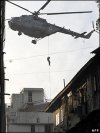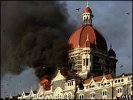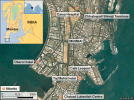Indian commandos are storming a Jewish centre in Mumbai, where gunmen are holding a number of people hostage.
Troops abseiled from a helicopter into the building, as a ground assault was launched. Gunfire was later heard.
Security forces are still clearing gunmen from two luxury hotels, more than a day after attacks that killed more than 130 people and injured 300.
About 30 more people have been rescued from the Oberoi Trident hotel - the majority are said to be foreigners.
At first light helicopters swooped over the Nariman House business and residential complex in south Mumbai, which houses the Jewish outreach group Chabad Lubavitch.
Commandos initially dropped "thunder flashes" or smoke bombs to create confusion and then several troops abseiled down ropes to secure the roof.

At first light helicopters swooped over the building housing the Jewish Centre
The BBC's David Loyn say they have been tentatively moving down through the building trying not to cause casualties among the hostages. Earlier, a woman and child were seen leaving the building, but it was unclear whether they had managed to escape or were released.
The child was identified as the two-year-old son of Rabbi Gavriel Noach Holzberg, the main representative at the ultra-orthodox outreach centre. There was no word on the rabbi's fate.
Meanwhile, security forces are still moving room-to room at the luxury hotels targeted in Wednesday's attacks - the Taj Mahal Palace and Oberoi Trident.
Our correspondent says that police and army sources are cautious about declaring that either of the hotels are yet fully under control.
He says the Taj hotel is a huge complex where militants could still be hiding. He adds that gunfire was heard overnight at the Oberoi.
In a separate development, the Indian navy has taken control of two Pakistani merchant navy ships and is questioning their crews after witnesses said some of the militants came ashore on small speed boats.
Conflicting clues
Gunmen armed with automatic weapons and grenades targeted at least seven sites in Mumbai late on Wednesday, opening fire indiscriminately on crowds at a major railway station, the two hotels, the Jewish centre, a hospital and a cafe frequented by foreigners.
See detailed map of the area
The attacks are the worst in India's commercial capital since nearly 200 people were killed in a series of bombings in 2006.
On Thursday, the Indian prime minister said the government would "take whatever measures are necessary to ensure the safety and security of our citizens".
Mr Singh said the attackers were based "outside the country" and that India would not tolerate "neighbours" who provide a haven to militants targeting it.
MUMBAI ATTACKS
 Method in attackers' madness
Attackers create 'killing zone'
Are you in the area?
Method in attackers' madness
Attackers create 'killing zone'
Are you in the area?
India has complained in the past that attacks on its soil have been carried out by groups based in Pakistan, although relations between the two countries have improved in recent years and Pakistani leaders were swift to condemn the latest attacks.
The Pakistan-based militant group Lashkar-e-Toiba denied any role in the attacks.
A claim of responsibility has been made by a previously unknown group calling itself the Deccan Mujahideen.
Eyewitnesses at the hotels said the attackers were singling out British and American passport holders, which our security correspondent Frank Gardner says implies an Islamist motive - attacks inspired or co-ordinated by al-Qaeda.
But as investigators from other countries join the hunt, he says, most intelligence officials are keeping an open mind as the attacks have thrown up conflicting clues.
Co-ordinated, mass casualty attacks that target civilians and undefended buildings are very much in the al-Qaeda mould.
But our correspondent says al-Qaeda and its affiliates in the region tend to favour massive truck bombs driven into buildings by suicidal volunteers - that didn't happen in Mumbai.
He says al-Qaeda are also acutely media-savvy, filming their attacks and in the case of hostages, sometimes murdering them on camera. Again, that does not appear to have happened this time.

BBC









